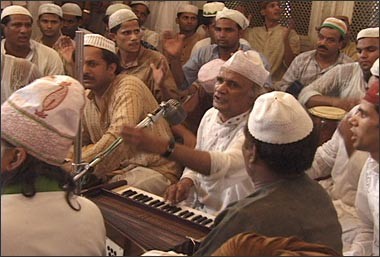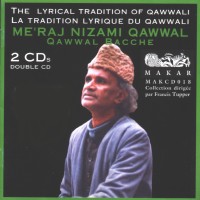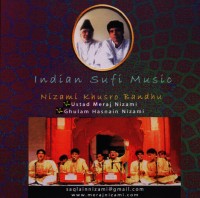 Lineage
Lineage
| Contents: | About Ustad Meraj Nizami Links CD's |
Born and raised in a Sufi family, Meraj Ahmed Nizami Qawwal belongs to the community of the Hazrat Nizamuddin Auliya Dargah, birthplace of qawwali and tomb of its founders.
He owns the kalifa of the lineage of the Qawwal Bacche, sons of the original qawwal singers trained by Amir Khusro. His family continued the tradition over 700 years and 30 generations.
Ustad Meraj Ahmad Nizami started his training in classical music as a child, under the rigorous tutelage of his father, Ustad Yaqub Ali Khan (Piarey Khan Sahib). Today, he is in charge of the Hazrat Nizamuddin Auliya Dargah in Delhi and has been performing at the Dargah of Sufi Hazrat Inayat Khan every week for the past 40 years.
Ustad Meraj Nizami's memory is as legendary as his knowledge of languages and poetry. He knows over a thousand qawwali's and many more poems by heart in many languages: Arabic, Persian, Hindi, Urdu, etc. He masters various genres of classical music, such as Dhrupad, Khayal, Tarana, Thumri and Dadra, which he blends beautifully during his performances of Qawwali. His style of singing is at once tender, direct and pure.
By his sincerity and his complete devotion to the Sufi way, he has become a
reference in his community and has received four times the Khilafat, (a title
that gives him the rank of a spiritual guide).
He has been declared
Bulbul-e-Chisht (the nightingale of the Chishti lineage, a rare dinstinction) by
Khwaja Hasan Nizami.
After an extended period of poor health Meraj Ahmed died on Oct 18th, 2015
Singing Qawwali is very much a family tradition, passed on from fathers to sons. The music is never written down, the words only in recent times - and still only incompletely.
That Ustad Meraj Nizami educated his children in the tradition goes without
saying. His eldest son, Gulam Hasnain, now often sits beside him, assisting him
as lead singer, during the mehfil.
Not self evident at all, however, is
that he shares his knowledge freely with others outside the family, Indian singers
and even Westerners. Many Indian singers (the famous Abida Parveen among them)
have recognized their debt to the old master.
Complementing his oral legacy, over 200 hours of audio and video recording of
his work are archived in the U.S. Ethnomusicological Archives in Delhi.
The
content of two authoritative books about Qawwali music is for a large part based
on his prolific memory: Sufi Music of India and Pakistan, Sound,
context and meaning in Qawwali by Regula Burckhardt Qureshi, and
Qawwali, la musique des maitres du soufisme by Claire Devos.
 Lineage
LineageThe roots of Qawwali can be traced back from 8th century in Persia (today's Iran and Afghanistan). During the first major migration from Persia, in the 11th century, the musical tradition of Sema migrated to the Indian subcontinent, Turkey and Uzbekistan.
Amir Khusro Dehelvi of the Chisti order of Sufis is credited with fusing the Persian and South Asian musical traditions to create Qawwali as we know it today in the late 13th century in India (Hindustani classical music is also attributed to him). Hazarat Amir Khusro trained 12 children in the performance of qawwalis; they are known as "Qawwal Bachche" and the families associated with them are known as Qawwal Bachchon Ka Gharana (The household of Qawwal Bachche).
Ustad Meraj Ahmed Nizami is the most senior amongst the descendents (4th Generation) of Tan Ras Khan Sahib (founder of Delhi Gharana and teacher of the last Mughal Emperor Bahadur Shah Zafar), who is a descendant of Mian Samad Bin Ibrahim, the first pupil of Hazrat Ameer Khusro and the Group Leader of the Qawwal Bachoon Ka Gharana.
The word "Qawwali", by the way, is derived from the Arabic word "Qaol" which means "axiom" or "dictum".
Obituary in the Delhi Walla
Trance music in Delhi's most famous sufi shrine
Facebook page
Ustad Meraj Nizami on YouTube
A search for 'meraj ahmed nizami' on YouTube will provide lots more results.
Hommage by the Nizami Khusro Brothers, Meraj's sons (YouTube)
Here are some CD's you can order; I'll put in some snippets of the music as well, as soon as I can find the time. Meanwhile, you can listen to his music on Ustad Meraj's website.
Recordings made during Ustad Meraj's recent visit to The Netherlands you will find here

| The Lyrical tradition of Qawwali (2 CD's)Disk 11 Allah hu - 2 Jahan roshan ast az - 3 Man kunto Mawla - 4 Ayiore yah kaun pargato - 5 Lata mafi - 6 Aj rang hai - 7 Chab tilaak - 8 Bartoe mehfile shahaana - 9 Har etebaar se aaj tak 10 Na man behu da girde - 11 Yah kisne nigahon 12 Leke dil me mohabbat - 13 Chura deti hai Disk 2 1 Bah khubi - 2 Man mohan jab chap dekhla'i - 3 nayat ki nazaar - 4 Phool rahi saarson sagan ban hai - 5 Mose naina mat murhna - 6 Bhala hua mori matki phutti - 7 Rum jhum ke bajaao - 8 Vah hi aabile - 9 Ae misle to dar - 10 Na kisi chiz me - 11 Ham ko yahan dar dar piraaya - 12 Aj badhava 13 Meri maili gudariyan dho le - 14 Kafir-e 'ishq hun - 15 Bhuji hui - 16 Yah mere hadde nazaar ki Accompanyment : Vocal : Chand Nizami, G. Hasnain, Q. Ahmed, G. Sibtain
Price: € 25,- + postage & packaging. |

|
Indian Sufi MusicPrice: € 15,- (+ postage & packaging) |
To order: send an email to: qawwali@sufiway.nl.